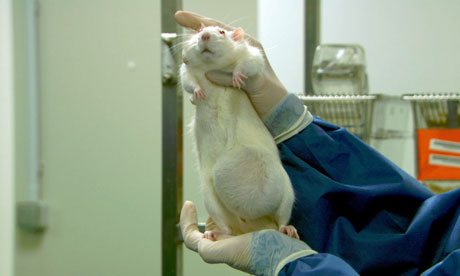
(
http://rt.com/op-edge/monsanto-gmo-studies-reports-588/)
The
Journal of Food and Chemical Toxicology has caved under pressure from the biotech industry and agreed to retract Gilles-Eric Seralini's "controversial" experiment which showed that rats fed Monsanto's genetically modified (GM) corn developed tumors.
The study was controversial because it was the first to attempt to examine the long-term effects of consuming Monsanto's NK603 Roundup-tolerant corn. Previous experiments only covered periods of 90 days or less, which means that they were severely limited when you consider that corporations expect their customers to unquestioningly eat GMOs over their entire lifespan. Since the industry has been unable to produce any data refuting Seralini's results, they have instead been furiously working to discredit them. Monsanto's study only examined rats on a GMO diet for 90 days and dismissed signs of toxicity as "not biologically meaningful."
When the European Food Safety Authority (EFSA) recommended approval of NK603 in 2009, they did so without conducting any independent testing and relied solely on Monsanto's data, who would profit the most from it, of course. After Seralini's study was published, the EFSA attacked it, saying that "it does not meet acceptable scientific standards."
However, as William Engdahl of
RT.com notes, "EFSA argued that Seralini had used the wrong kind of rats, not enough rats and that the statistical analysis was inadequate. By these standards, all toxicity studies on glyphosate and GMOs should be retracted because they used the same type and approximate number of rats as those in the Seralini study."
Even if the study was flawed, just the fact that it was the first long-term study performed and that it observed disconcerting tumor growth correlating to GMO consumption warrants exercise of the precautionary principle and further independent testing, especially before blindly accepting safety tests from the very people who seek to make money off of its approval.
Despite being discredited, the study was still circulating and being cited by others, so, in May 2013, Elsevier, the journal's publisher, appointed former Monsanto employee and pro-GMO lobbyist Richard E. Goodman to the newly created position of "Associate Editor for Biotechnology."
So now, after Seralini's experiment went through a four-month review period and has been published for over a year, the
Journal of Food and Chemical Toxicology has decided to retract the paper. This violates Committee on Publication Ethics guidelines, which state that the only reasons for a journal to retract a paper are as follows:
• Clear evidence that the findings are unreliable due to misconduct (e.g. data fabrication) or honest error;
• Plagiarism or redundant publication;
• Unethical research.
Rather than meeting any of these criteria, Seralini's paper is being retracted due to its "inconclusiveness." This not only violates ethical guidelines but undermines the very foundation of science. Papers are not published to be conclusive but rather to provide new data and information for researchers to build upon in the future. This retraction slows the progress of science, ignores important safety information and puts all of our health at further risk.
